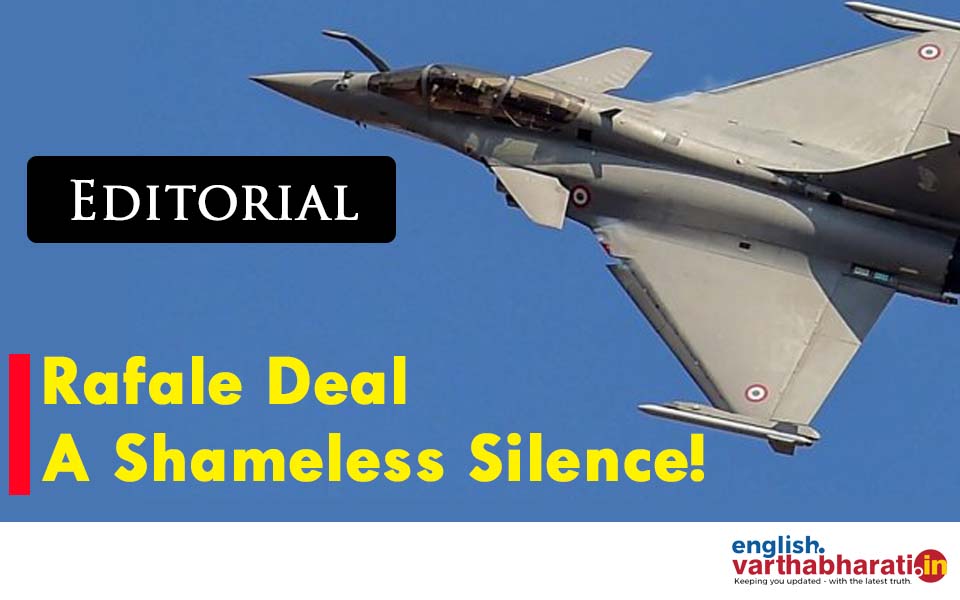When the country is still struggling with the second wave of the Coronavirus, the government finds itself caught in the Rafale whirlpool yet again.The controversy over the Rafale deal broke out much before the pandemic with several organizations approaching the Supreme Court demanding an investigation into the deal but without any success as the apex court held the view that that ‘there is no need for an investigation.’
The NDA government seems to have considered the Supreme Court’s stand as a clean chit for itself forgetting that there is a difference in saying that there is no need for an investigation and getting an acquittal after prosecution. When the CBI showed some interest in the Rafale deal, the government clipped its wings.. Everyone who demanded an investigation was portrayed as “having no concern for the national security.”
After Modi got elected for the second term, the Congress party also became silent over the Rafale deal. Just when it was assumed that the controversy had died down, it has now resurfaced with the French government ordering a judicial probe into a French company’s role in the alleged deal. This was after a French website published several explosive reports that millions of Euros were exchanged as part of the agreement between the Indian government and the French company, Dassault, and that Indian officials were also bribed. Transparency over the deal pertaining to the purchase of Rafale aircraft is more important to India than France as it could have an impact on India’s defence whereas for France it could only be an issue of financial irregularities.
Though it was the UPA government that laid the foundation for the controversial Rafale deal, it had roped in Hindustan Aeronautics Limited (HAL), the pride of India in the aviation sector, as a partner and the deal provided an opportunity for purchasing a large number of aircrafts at lower prices besides acquiring latest aircraft technologies. But after the Modi government came to power, significant changes were made to the deal including the questionable move of replacing HAL with Reliance that had no prior experience in the defence sector.
Not just that, as a part of the revised agreement, India agreed to pay more for fewer aircrafts. When a whiff of the large-scale irregularities was felt, protests were organized throughout the country with several investigating agencies raising doubts but all such suspicions were stamped down and several important letters of correspondence and documents went missing. In effect, the government put a lot of effort and made sure that no investigation could be carried out and gave itself a clean chit.
Similarly, decades ago, when the Bofors controversy broke out, an investigation was conducted but the investigation refuted Rajiv Gandhi’s involvement and gave him a clean chit. Arun Shourie who was then writing about the Bofors scam had said in a press conference that the Rafale deal is larger in magnitude than Bofors. Regardless of the fact that several journalists and lawyers approached the Supreme Court demanding an investigation into the Rafale deal, Prime Minister Modi should have on his own ordered an investigation. If it did not have any role in the deal, why is the Modi government hesitating to face an investigation? An investigation would not only shut the opposition but also increase Modi government’s credibility. More than anything else, it would resolve the concerns that people have over the nation’s security. Ironically, by not ordering an investigation, it is almost like Modi has in part accepted the allegations.
The French government’s investigation has given a fresh lease of life to the controversy with questions being raised over India’s silence. The Opposition is demanding an immediate investigation by a Joint Parliamentary Committee. When a country that is part of the deal has expressed its suspicion about financial irregularities, how can India that is a party to the deal not be anguished? If financial irregularities have indeed taken place, India has a lot to answer. Even then, why is the country’s “chowkidar” not uttering a word? This is shameless silence. The fact that an international controversy that has national ramifications on the army and defence sectors has not stirred the government to take cognizance of the issue could trigger yet another round of ‘Chowkidhaar Chor” slogans. Before such slogans can reverberate all across the country, the Chowkidhar must speak.
Let the Truth be known. If you read VB and like VB, please be a VB Supporter and Help us deliver the Truth to one and all.
Kalaburagi: Four men have been arrested in Kalaburagi on charge of hacking a man with lethal weapons and pelting stones at him under the limits of Station Bazaar Police Station recently.
According to police sources, Anand Jalak Shinde (34), Ashitosh Jalak Shinde (30), Imran Mehboob Sheikh (28) and Sohaib Anwar Qureshi have been arrested. The men are accused of the brutal murder of Syed Mehboob, a resident of Station Bazaar Upper Line Hamalawadi in the city.
An FIR was filed by the Station Bazaar Police Station based on a complaint given by Syed Ismail, father of the deceased Syed Mehboob.
Following quick probe, the police team successfully arrested the suspects within 24 hours. The arrested men were produced in court and have been sent to judicial custody.
The City Police Commissionerate has appreciated in an official release the police team’s quick solving of the murder case and arrest of the four men accused of murdering Syed Mehboob.





